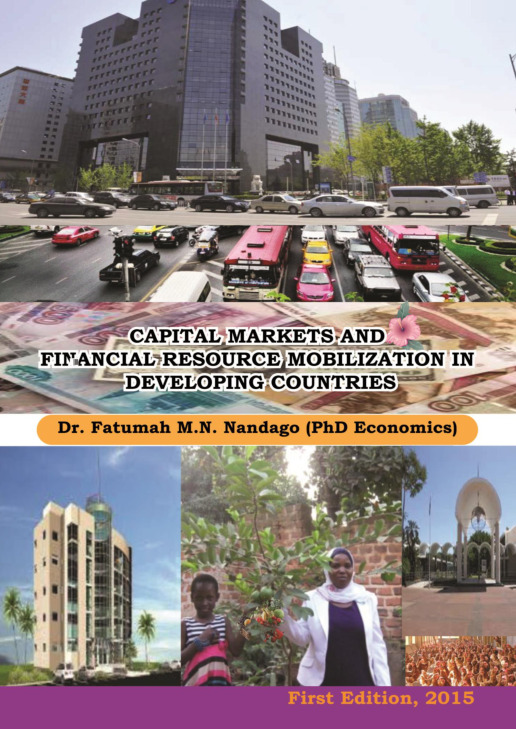 Tunggu Sebentar...
Tunggu Sebentar...

Capital Markets and Financial Resource Mobilization in Developing Countries
Capital Markets play a major role in mobilizing and allocating scarce resources in an economy and indeed they constitute a very important part of an economy for both developed and developing economies. To the developed world, the markets are part of everyday life for millions of people; ordinary and the elite, business class and policy makers. This is totally different for the developing world. The turbulent nature of the business world today necessitates that the working of Capital Markets is not only well understood by investors and issuers and all potential players in the market, but also made easily accessible for them and should therefore be brought to the mainstream economic planning of the developing world. The potentiality of the markets and their development synergy need be explored and developed in developing countries too. This simple Text Book serves to bridge this apparent gap by bringing to the fore, the significance of this segment of the financial system-the Capital Market, in effectively and efficiently mobilizing and allocating financial resources in a Developing Country context. This book has been organized in ten Chapters with an underlying motive of giving clarity to a cross section of readers. The first Chapter of the Book named Introduction introduces the theme of the Book by specifically addressing the key concepts therein namely Developing Countries and their characteristics or problems, what it takes to mobilize financial resources from both domestic and foreign based sources and the challenges thereof. Chapter two of the Book named Capital Formation in Developing Countries gives a digest of the major policies under the control of Developing Countries governments to enhance financial resource mobilization for national development of the respective countries. Chapter Three named Capital Formation and Capital Markets Investments describes how Capital Markets aid in the accumulation of Capital for a Developing Country through the various investment opportunities availed by the Capital Market namely Stocks, Bonds and Preferred Shares. Chapter Four which is Capital Market Risk and Return Analysis clearly explains the monetary gains or otherwise, an investor should expect from his or her investment in the market. The specific benefits or rewards from investing in a Stock Market and the Risks inherent in all the various Capital Markets investments together with their probable sources are digested. Chapter Five provides tools of analyzing the worthiness of the investment to be made in the Capital Markets before investors make investment decisions regarding committing their monies into those Capital Markets investments. The Chapter presents how bonds, common stocks and preferred stocks are theoretically valued to determine their true or fair value, the basis upon which their market value or market price is determined. Chapter Six presents the various sources of capital for the operation of the firm, the cost of each source of funds, the determinants of the individual costs of capital and the relevancy of Capital Markets in this process. While performing all these functions, the Capital Market needs to secure the confidence of all market participants mainly the investors and issuers (both incumbent and potential) in order for it to attract and retain a vigorous business clientele. This requires that the market is efficient in executing its roles. Therefore the relevancy of the Efficient Capital Market Theory is presented in Chapter Seven, where the various forms of the EMH along with their empirical tests and ways through which Capital Markets can be made efficient in Developing Countries are identified. The operation of the Capital Market is discussed in Chapter Eight, where the related Capital Market Institutions and their roles in securities trading and funds mobilization are presented from a practical point of view, giving mention of the performance indicator of Stock Market indices. While Chapter Nine of the Book gives a thorough digest of the role Stock Markets play in helping solve some of the social economic problems faced by Developing Countries in general and hence giving the justification for their stand, Chapter Ten provides insights of how Capital Markets can be made Engines of Growth in Developing Countries. This is for the explicit contemplation of policy makers, investors as well as agitators of development in Developing Countries.
| Jumlah Halaman | 298 |
| Penulis | Fatumah M.N. Nandago |
| ISBN | 978-602-401-094-2 |
| Tahun Terbit | 2017 |
| Penerbit | Deepublish |
| Stok Buku | 0 / |
